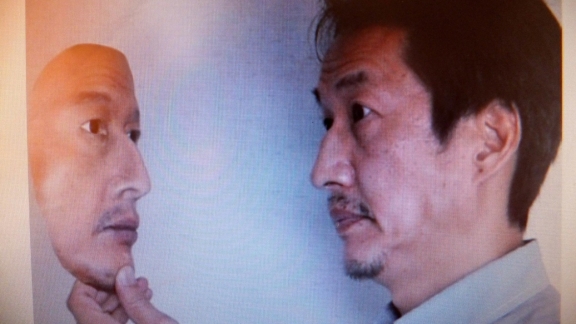
An online seller showcases the authenticity of a silicone face mask.
In March, a man in Shanghai used a silicone face mask to disguise himself as an elderly person and broke into four homes, stealing over 100,000 yuan (US$13,700) worth of valuables. He was later arrested and all the stolen goods recovered.
This was not an isolated incident. Rather, it is part of a worrying trend. Police in cities across China are warning that criminals are now using these masks to disguise themselves and commit crimes. Originally used in movies, TV shows and theater, silicone face masks are becoming the new go-to tool for illegal activities.
The masks that help criminals disguise their appearance and bypass security systems have become so realistic and accessible that they now pose significant legal and regulatory challenges.
A Shanghai Daily investigation into several online silicone face mask sellers revealed a wide variety of realistic masks available, often at high prices.
Searching for “silicone mask” on multiple e-commerce platforms reveals products like “full-face adult silicone masks,” “realistic disguise masks” and “elderly silicone masks.” Prices range from a few yuan to several thousand yuan.
One top-selling online store described three main types of disguises: silicone masks, sandstone masks and full silicone hoods with hair.
Prices vary significantly. A customized hood costs 23,000 yuan and takes a month to make, while a mask takes 20 days and costs 15,000 yuan. Sandstone masks are the cheapest at 8,800 yuan and take 10 days. No customer ID is required.
Many sellers also offer celebrity look-alike masks, accurately replicating famous faces. In one video demonstration, a model wearing a celebrity mask looked about 90 percent like the celebrity from a distance.
“After you place an order, we’ll direct you to a local 3D scanning point. If you can’t go, provide photos, head measurements and 360-degree facial images,” one seller advised potential customers.
Many sellers offer celebrity look-alike masks on the e-commerce site Tmall.
Mask designers use the materials provided by a buyer to create a model, confirm it with the customer, and then proceed with production. Local 3D scanning points require an order or seller referral before providing their address.
Buyers make such expensive purchases for specific purposes, like unlocking a spouse’s phone with facial recognition, clocking in at work or bypassing security systems.
Another seller said if a mask didn’t pass smartphone facial recognition, buyers could return it.
A customer confirmed online that the mask easily passed facial recognition on phones and payment platforms but struggled with systems sensitive to eye and skin color tests.
“I don’t want to bypass any security system,” one customer told Shanghai Daily. “I had a mask made of my favorite football player simply to display it in my bedroom.”
Many online sellers operate without a business entity or license. They claim to engage in small, casual transactions, thus not needing business registration.
According to China’s E-commerce Law, personal sales of agricultural or handicraft products, or casual small transactions, do not require registration.
With 3D scanning technology, a facial mask can replicate detailed traits of human faces.
However, Li Rui, an associate professor from Shanghai University of Finance and Economics, said these masks are not merely decorative but rather are carriers of private identification information and they should be classified accordingly.
Lawyer Liu Jiong from Xiamen University told Legal Daily that selling these masks online could involve various legal risks, including civil, administrative and criminal liabilities. If the masks mimic specific individuals without their consent, such use could infringe on portrait rights, potentially leading to defamation claims.
“Making masks isn’t wrong,” Liu said. “The key is in regulating their use. Relevant authorities should grade the realism of face masks.”
Masks capable of passing facial recognition should be strictly regulated, with encoded sales and more stringent oversight. Liu suggests strict identity verification and usage checks for custom masks. Highly realistic masks should be registered and reviewed by police.
Public education is also essential. Manufacturers should provide guidelines on legal use of the masks.
Consumers should be vetted, and consent for likeness use should be obtained. Balancing personal freedom, market transactions and public safety is crucial, Liu said.
Criminals hiding behind masks aren’t confined to China.
In 2010, a young man taking an Air Canada flight from Hong Kong to Vancouver wore a silicone mask to impersonate a white elderly man, using false identification.
In 2011, a Southern California bank robber known as the “Geezer Bandit” used a silicone mask to look like an old man.
In 2019, a drug lord incarcerated in Brazil had his 19-year-old daughter visit him in prison. In a bid to escape, he wore a silicone mask, a wig and her clothing to look like her. He sneaked out, leaving her behind.
>>> Read full article>>>
Copyright for syndicated content belongs to the linked Source : Shine – https://www.shine.cn/news/in-focus/2407035278/
